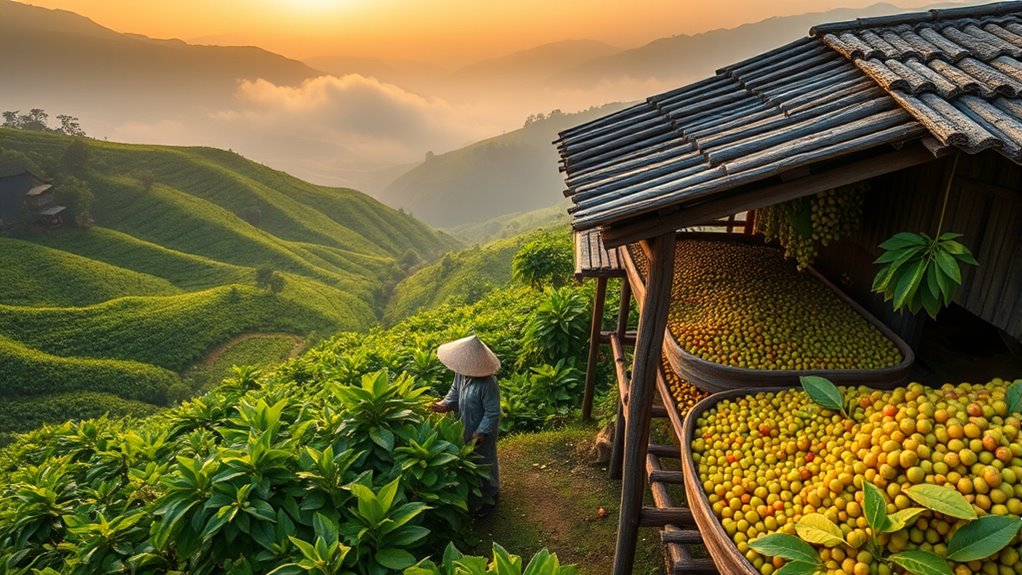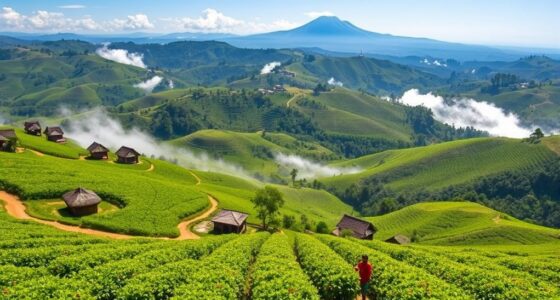Vietnam’s coffee revolution has turned it into a global Robusta powerhouse by adopting sustainable farming practices that improve quality and protect the environment. These methods boost soil health, support biodiversity, and enhance crop resilience, making Vietnam a reliable supplier of high-quality, ethically produced beans. The country’s focus on innovation and sustainability has strengthened its reputation in international markets, opening new opportunities for growth. Keep exploring to discover how Vietnam’s efforts are shaping the future of coffee.
Key Takeaways
- Vietnam is adopting sustainable farming practices to enhance coffee quality and environmental resilience.
- The focus on responsible production boosts Vietnam’s reputation as a reliable, ethical coffee exporter.
- Industry innovations improve bean quality, flavor, and resilience against climate change and pests.
- Vietnam’s emphasis on sustainability transforms its coffee from a commodity into a symbol of responsible production.
- These efforts position Vietnam as a leading global Robusta producer, appealing to premium, eco-conscious markets.

Vietnam is experiencing a coffee revolution that’s transforming the country’s economy, culture, and global reputation. As one of the world’s leading coffee producers, Vietnam has shifted its focus toward sustainable farming practices that not only boost local communities but also guarantee the longevity of its coffee industry. Farmers are adopting innovative methods to reduce environmental impact, such as integrated pest management and water conservation techniques. These efforts help maintain soil health and protect biodiversity, which are vital for the long-term viability of coffee cultivation. sustainable farming practices play a crucial role in ensuring the resilience of Vietnam’s coffee industry amid climate challenges. By prioritizing sustainable farming, Vietnam is positioning itself as a responsible exporter, appealing to international markets that demand ethically produced products.
Vietnam’s coffee industry is thriving through sustainable practices that protect the environment and empower local communities.
This emphasis on sustainability directly influences Vietnam’s ability to access and expand its export markets. Consumers worldwide are increasingly conscious of the origins of their coffee, seeking products that are environmentally friendly and socially responsible. Vietnam’s commitment to sustainable practices strengthens its reputation as a reliable supplier of high-quality coffee, particularly robusta, which dominates its production. As a result, you’ll notice that Vietnamese coffee is gaining popularity in premium markets, from specialty cafes in Europe to health-conscious consumers in North America. Exporters are capitalizing on this trend by certifying their coffee as organic or Fair Trade, which further enhances Vietnam’s standing in the global coffee landscape.
Furthermore, adopting sustainable farming techniques encourages innovative approaches that improve crop resilience against climate change and pests, ensuring the industry’s long-term stability. The country’s efforts to improve quality through sustainable farming also open doors to new markets and higher-value opportunities. Vietnam’s government and industry stakeholders are investing in training programs that teach farmers better techniques for harvesting and processing coffee. These improvements lead to beans with superior flavor profiles and consistent quality, making Vietnamese coffee more competitive internationally. As you explore Vietnamese coffee, you’ll appreciate the blend of traditional methods and modern innovation, which together elevate the product’s reputation.
Vietnam’s rise as a robusta powerhouse is not just about increasing volume; it’s about building a resilient, sustainable industry that meets the demands of a changing world. This shift helps secure the country’s role as a key player in global coffee trade, ensuring that its economy benefits from the growing demand for ethically produced, high-quality coffee. By championing sustainable farming practices and expanding into diverse export markets, Vietnam is transforming its coffee industry from a commodity into a symbol of responsible production and global excellence. For you, this means enjoying a cup of Vietnamese coffee that’s not only rich in flavor but also rooted in practices that support the planet and empower local communities.
Frequently Asked Questions
How Does Vietnam’S Climate Influence Robusta Coffee Quality?
The climate impact plays a significant role in shaping robusta coffee quality factors you encounter. Warm temperatures, high humidity, and consistent rainfall in Vietnam create ideal conditions for robusta cultivation, enhancing bean flavor and resilience. These elements help develop the coffee’s full-bodied profile and strong aroma. Your experience with Vietnamese robusta reflects these quality factors, as the climate guarantees healthy plants and rich, robust flavors that set it apart globally.
What Are Vietnam’S Main Export Markets for Robusta Coffee?
Imagine your favorite coffee shop, where the aroma of robusta beans fills the air—that’s a taste of Vietnam’s main export markets. You should know that Vietnam primarily exports robusta coffee to countries like the U.S., Germany, and China, driven by global demand. Market diversification helps Vietnam reach diverse consumers, ensuring steady growth. You’re part of this global coffee journey, connecting with markets that crave the bold flavor Vietnam offers.
How Does Vietnamese Coffee Production Impact Local Communities?
You can see that Vietnamese coffee production substantially impacts local communities through social impact and economic development. It creates jobs, boosts local incomes, and supports infrastructure growth. However, it also brings challenges like environmental stress and social disparities. By participating in or supporting sustainable practices, you help communities thrive, ensuring that economic benefits lead to positive social outcomes, and fostering a balanced, resilient coffee industry.
What Innovations Are Driving Vietnam’S Coffee Industry Forward?
You’re curious about what drives Vietnam’s coffee industry forward. You’ll see that coffee processing techniques have become more efficient, thanks to technology innovations like automated sorting and quality control systems. These advancements help increase yield, improve flavor, and reduce waste. By adopting modern machinery and innovative practices, Vietnam’s coffee industry stays competitive globally, ensuring higher quality products and sustainable growth for local communities and exporters alike.
How Do Vietnamese Coffee Farmers Maintain Sustainability Practices?
You can guarantee sustainability by adopting eco-friendly practices like integrated pest management and water conservation techniques. Focus on sustainable farming methods that protect soil health and reduce chemical use. Supporting local initiatives and certifications encourages ethical practices. By prioritizing biodiversity and reducing waste, you help maintain long-term productivity and environmental health. Your efforts in sustainable farming directly contribute to a resilient coffee industry and a healthier planet.
Conclusion
As you witness Vietnam’s coffee revolution, you feel the pulse of a nation turning its dreams into bold, aromatic reality. The robusta beans are not just seeds—they’re the heartbeat of a new era, fueling hope and resilience. This journey is a vibrant tapestry of passion and perseverance, inviting you to taste the future in every sip. Embrace this awakening, where every cup tells a story of transformation and unstoppable spirit.









